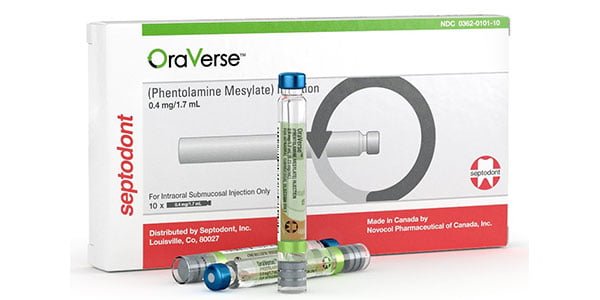
Lancaster, Pennsylvania, USA – May 30, 2016 – Septodont announced that the United States Food and Drug Administration (FDA) has approved the change of the minimum age for OraVerse (Phentolamine Mesylate) from 6 years old to 3 years old. The approval came as the result of a Phase IV, Multicenter, Randomized, Double-Blind, Controlled Study for the safety and efficacy of OraVerse in Pediatric Patients ages 3 – 5.
OraVerse (Phentolamine Mesylate) is the first and only product to rapidly reverse the lingering numbness of the lip and tongue from local dental anesthetic. OraVerse is administered by the dentist immediately following routine procedures such as a filling or crown prep. Busy people who need to return to their jobs, kids who tend to chew their numb lips and cheeks, and diabetics who need to eat following a procedure are the types of individuals who can benefit greatly from OraVerse.
OraVerse is manufactured by Septodont and is available for purchase through a dental dealer. Septodont is a dental pharmaceutical company that specializes in innovative, safe and effective solutions for dentistry worldwide.
About OraVerse®
OraVerse is a breakthrough that reverses unwanted lingering numbness after routine dental procedures where a local anesthetic containing a vasoconstrictor was used. OraVerse is indicated for reversal of the soft-tissue anesthesia, i.e., anesthesia of the lip and tongue, and the associated functional deficits resulting from an intraoral submucosal injection of a local anesthetic containing a vasoconstrictor. OraVerse is not recommended for use in children less than 3 years old or weighing less than 15 kg (33 lbs). In clinical trials, the most common adverse events with OraVerse (phentolamine mesylate) vs. control were post procedural pain (6% vs. 6%), injection site pain (5% vs. 4%), tachycardia (5% vs. 6%), bradycardia (2% vs. 0.3%) and headache (3% vs. 4%). Following parenteral use of phentolamine in non-dental indications, myocardial infarction and cerebrovascular spasm and occlusion have been reported, usually in association with marked hypotensive episodes producing shock-like states. Although such effects are uncommon with OraVerse, clinicians should be alert to the signs and symptoms of tachycardia and cardiac arrhythmias, particularly in patients with a history of cardiovascular disease, as these symptoms may occur with the use of phentolamine or other alphaadrenergic blocking agents. See full prescribing information – for details go to www.oraverse.com.
Stay Relevant With Endodontic Practice US
Join our email list for CE courses and webinars, articles and more..


